CONTEMPORARY LEGAL DILEMMA
Affective relationships and the “sacredness of the human”
Abstract
The dating contract and the protection of assets - its effectiveness and validity as a skillful way of generating rights and obligations, in front of the express expression of the parties' will and before the realization of possible elements characterizing the stable union. The article provides a brief historical-social contextualization of the concept of "the sacralization of the human" of the philosopher Luc Ferry (2012), encompassing the contours of the doctrine of Family Law until the present times, It demonstrated the concept of Stable Union established by CC/2002 and its limitations in the face of affective relations, finally made a study on the dating contract in the doctrinal and jurisprudential sphere. The research is justified for society, because it contributes daily with a logic of prevention and the guarantee of a natural right, in addition the contract proved to be extremely important as a means of proof. Through theoretical-dogmatic and deductive methods, he came to the consideration that the natural right to marry, to constitute a stable union or not, is linked to the universal idea of justice, because it is natural law. whereas there is little differentiation between dating and stable unions, especially those with continuous and lasting public relationships, the proposal for a solution based on the effectiveness and validity of the dating contract has been reached, making it a skilful way to generate rights and obligations in civil life; suffice, for the protection of the couple’s rights to be achieved, to make an express declaration and renunciation of their intention, freely, spontaneously and without vices, registered in the registry office, with a fixed period of validity.
Downloads
Published
How to Cite
Issue
Section
License
Copyright (c) 2023 Revista de Direito Contemporâneo UNIDEP

This work is licensed under a Creative Commons Attribution-NonCommercial 4.0 International License.
You are free to:
- Share — copy and redistribute the material in any medium or format
- Adapt — remix, transform, and build upon the material
- The licensor cannot revoke these freedoms as long as you follow the license terms.
Under the following terms:
-
Attribution — You must give appropriate credit, provide a link to the license, and indicate if changes were made. You may do so in any reasonable manner, but not in any way that suggests the licensor endorses you or your use.
-
NonCommercial — You may not use the material for commercial purposes.
- No additional restrictions — You may not apply legal terms or technological measures that legally restrict others from doing anything the license permits.
Notices:
- You do not have to comply with the license for elements of the material in the public domain or where your use is permitted by an applicable exception or limitation.
- No warranties are given. The license may not give you all of the permissions necessary for your intended use. For example, other rights such as publicity, privacy, or moral rights may limit how you use the material.



